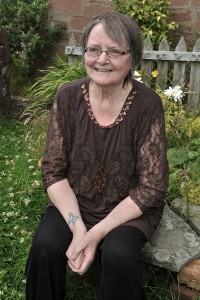 “ONE of the best kept secrets of Scotland’s traditional music scene” is how the renowned singer Sheena Wellington has described her fellow-Dundonian Maureen Jelks, describing her voice as “clear and pure as a choirboy’s, it has all the power and passion of a mature woman.”
“ONE of the best kept secrets of Scotland’s traditional music scene” is how the renowned singer Sheena Wellington has described her fellow-Dundonian Maureen Jelks, describing her voice as “clear and pure as a choirboy’s, it has all the power and passion of a mature woman.”
Maureen is a highly regarded and powerful interpreter of traditional song, whether as a soloist or in vocal groups such as Palaver, Tapsalteerie and the Dundee Rep Women’s Singing Group. Indeed she was paid the ultimate compliment by the famous traveller tradition-bearers, the Stewarts of Blair, who told her that she had “the coynach” – the elusive power which informs truly great singing. Yet in her youth she was crippled by shyness, finding it an ordeal to sing in public at all, and it wasn’t until she was 40 that she plucked up the courage to enter for the traditional singing competition at Auchtermuchty Folk Festival and amazed herself by winning it.
Now living in Kirriemuir, Maureen was born at 1 Little John Street in Dundee, the family moving to the now long demolished Overgate when she was three. Her mother was a fine singer but tended to sing songs from the 1940s – anything from Frank Sinatra to Carmen Miranda, with a few Scottish and Irish songs thrown in, including Mary Brooksbank’s Jute Mill Song and Bonnie Wee Jeannie McColl.
.Maureen started singing when she was about seven, but recalls her shyness. “When I was ten, my teacher put me in for the Leng Medal [for which Dundee schoolchildren still compete annually], but the day before I was to sing, I was sick – I used to worry so much.
“Much later in life, when I won that Auchtermuchty competition, it was great. I felt as if I had got my Leng Medal and I went on to win every competition I went in for.”
For Maureen, the festivals also enabled her to re-discover her Scottish roots. She had moved to London when she was 15, experiencing the various music scenes there – rock and roll, trad jazz, blues and finally the folk clubs of the Sixties. Returning to Scotland in 1970, it took her quite a few years before she investigated the traditional music scene north of the Border. It was a Dundonian friend, Christine Stewart, who took her to her first Scottish folk festival, in Kinross, which proved a revelation.
She was 40 by the time she entered that all-important first singing competition, and she found that competing in – and winning – the TMSA competitions at festivals helped her shed the shyness which had held her back for so long. One of the first singers she heard at that Kinross festival was Gordeanna McCulloch, whom she credits as an importance influence, as well as Belle Stewart and the Dundee singer, millworker and trade union activist Mary Brooksbank.
As well as developing her solo performance, making her a favourite at folk clubs and festivals, she pursued a love of harmony singing, performing with other, like-minded singers and joining groups such as Tapsalteerie and the Women’s Singing Group run by Dundee Rep. She sang for a while in a duo with Sheena Wellington, then teamed up with Aileen Carr, Chris Miles and Gordeanna McCulloch in the widely popular group Palaver.
She added another string to her bow in 1996 when she worked with the Newcastle-based theatre group Northern Stage, playing a traditional singer in the Spanish poet and playwright Federico García Lorca’s Blood Wedding. Working with actors from Britain and Spain, as well as the Northumbrian musician Alistair Anderson, she demonstrated that traditional song could be a powerful medium in any setting. “The director, Alan Lydiard, wanted me to sing Lorca’s poems in a Dundee accent,” she recalls.
Further theatre work has included a stage production of Betsy Whyte’s Yellow on the Broom, while in 1991 she was one of the singers featured in the BBC2 television series The Jean Redpath Song Masterclass. On the radio, she took part in a programme about the fishing industry, The Working Year, with Archie Fisher and has further broadcast on both BBC Radio Scotland and Radio Tay.
In recent years the Palaver quartet has been augmented by Pete Shepheard, Tom Spiers and Arthur Watson, all highly respected singers in their own right, to form the group Flash Company, while as a solo performer she has visited the United States to sing at the Celtic Women’s Festival in New Orleans and in Milwaukee, Wisconsin.
As well as recording with Palaver and contributing to various compilation albums such as Greentrax’s Scots Women, recorded live at Celtic Connections in 2001, Maureen has made two albums of her own. She recorded First Time Ever, at Dougie Maclean’s studio at Butterstone, Dunkeld, while more recently she made Eence Upon a Time for Living Tradition magazine’s Tradition Bearers series.
Reviewing the latter album, Roy Harris praised “the clear unforced quality of her voice … an honest and natural tone that is a delight to listen to.”
As well as prizes for traditional singing, she was presented with an Angus Achiever’s Award by her local council. The last few years have also seen Maureen greatly enjoy teaching traditional song in schools in Dundee and Fife – a far cry from the days when the prospect of singing at school made her feel ill.
Maureen passed away on 20th December 2018.
Written by Jim Gilchrist 2015